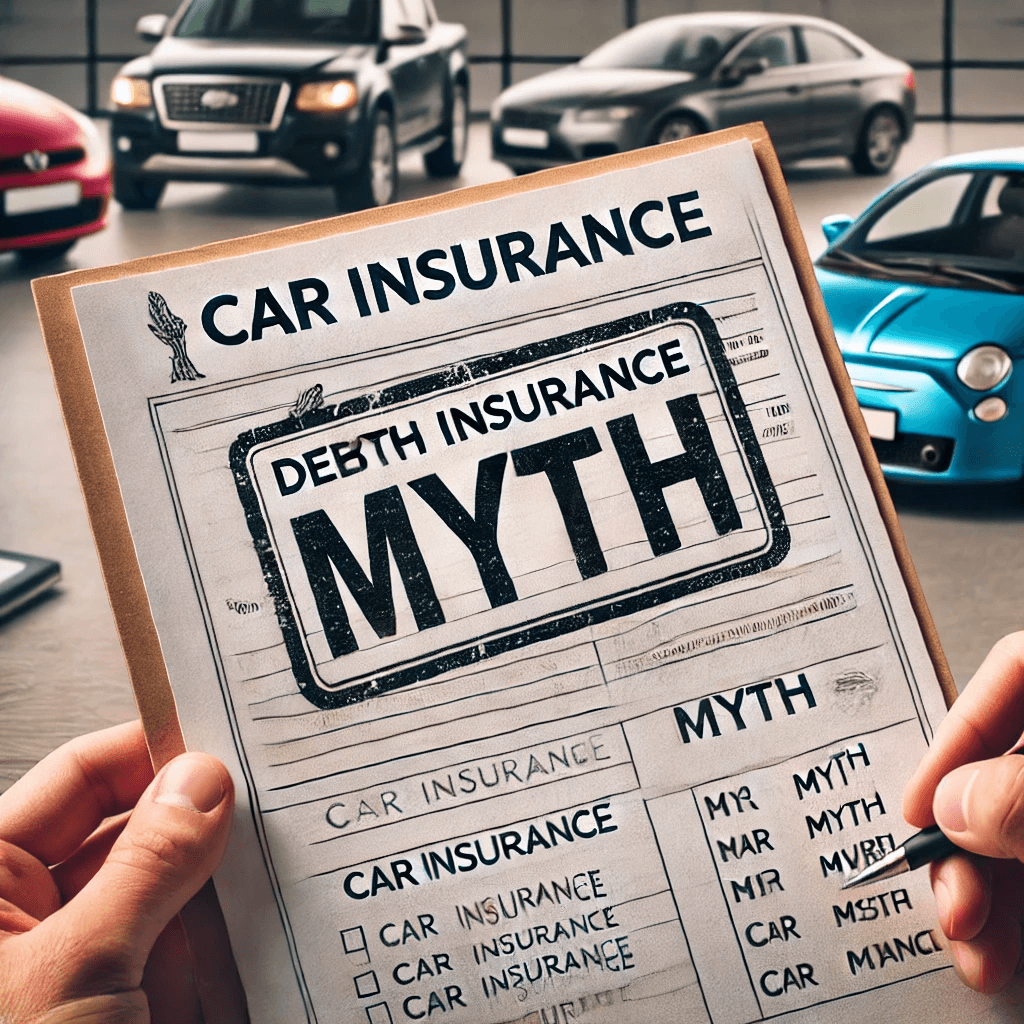Introduction
Car insurance is essential for protecting yourself and your vehicle, but there are many myths and misconceptions that can lead to confusion and mistakes when purchasing a policy. Here are some of the most common car insurance myths, debunked to help you make informed decisions

Are Red Cars Really More Expensive to Insure
Debunked:
One of the most persistent myths is that red cars are more expensive to insure because they are supposedly involved in more accidents or attract more speeding tickets. In truth, your car’s color does not affect your insurance rates at all. Insurers base their rates on factors like the make and model of the car, the car’s age, your driving history, and where you live.
Older Drivers Always Pay More
Debunked:
While it’s true that teenagers and very young drivers often face higher premiums due to their inexperience, older drivers do not always pay more. In fact, drivers between the ages of 30 and 65 often benefit from lower premiums because they are considered more experienced and less likely to engage in risky driving behaviors. However, premiums may increase again for senior drivers due to factors like slower reflexes and higher accident rates.
Your Personal Items in the Car Are Covered
Debunked:
Many drivers assume that if their car is broken into and personal belongings are stolen, their car insurance will compensate for the loss.
Unfortunately, this is not the case. Car insurance typically covers damage to your vehicle and liability for injuries, but not personal belongings inside the car. You would need to rely on your homeowners or renters insurance for coverage of personal items stolen from your vehicle.
Minimum Coverage Is Enough
Debunked:
While carrying the minimum required insurance is enough to keep you legally on the road, it might not be sufficient to fully protect you in the event of an accident. Minimum coverage usually only includes liability insurance, which covers damages to the other party’s vehicle and injuries but does not cover your own expenses. In the event of a major accident, the costs could easily exceed the minimum limits, leaving you personally liable for the remainder.
Your Credit Score Doesn’t Affect Your Premiums
Debunked:
Your credit score plays a major role in determining your car insurance premiums. Insurance companies frequently rely on credit-based scores to estimate the chances of a policyholder making a claim. A lower credit score could mean higher premiums, as insurance companies may see you as a higher risk. Conversely, a good credit score can help you secure lower rates.
Why Letting Your Car Insurance Lapse Can Be Risky
Debunked:
Letting your car insurance expire, even briefly, can lead to significant repercussions. Not only is it illegal to drive without insurance, but a lapse in coverage can lead to higher premiums when you seek new insurance. Insurers consider a lapse as a sign of higher risk, regardless of the reason for the gap
Comprehensive Coverage Means Everything Is Covered
Debunked:
Comprehensive coverage is frequently mistaken for “full coverage,” yet it doesn’t protect against all types of damage. Comprehensive insurance covers damage to your car from incidents other than collisions, such as theft, fire, vandalism, and natural disasters. However, it doesn’t cover collision damage, personal belongings, or medical expenses related to injuries you sustain in an accident. To be fully protected, you would need a combination of coverage types, including collision, personal injury protection, and others.
Small Claims Won’t Affect Your Premiums
Debunked:
Submitting a claim, even for small damages, can result in a hike in your insurance premiums. Insurance companies may view frequent claims as a sign that you are more likely to file future claims.
Other Drivers on Your Policy Don’t Affect Your Rates
Debunked:
If you list additional drivers on your policy, their driving history and risk profile will impact your insurance rates. This includes any accidents, tickets, or claims they have been involved in. It’s important to add only those drivers who regularly use your car and to review their driving records before listing them on your policy.
You Only Need Car Insurance When Driving
Debunked:
Some drivers think that a car doesn’t require insurance if it’s not in use. However, most states require continuous insurance coverage for any registered vehicle, regardless of whether it is in use. Additionally, if your car is damaged while parked or stolen, insurance is still necessary to cover the losses.
Common Car Insurance Myths Debunked: Don’t Fall for These Mistakes
Car insurance is a crucial aspect of responsible driving, but many people misunderstand how it works due to widespread myths and misconceptions. Falling for these car insurance myths can lead to inadequate coverage, higher premiums, or even legal trouble.
Your Car Insurance Covers Any Damage to Your Car
Debunked:
Many drivers believe that their car insurance will cover all damages to their vehicle, but this is not always the case. Standard liability insurance only covers damages you cause to others, not to your own vehicle. To protect your car against damages from accidents, theft, or natural disasters, you need comprehensive collision coverage.
Cheaper Car Insurance Means Less Coverage
Debunked:
While a lower premium often suggests reduced coverage, this is not always true. Insurance providers offer various discounts that can lower your premium without compromising your coverage. For instance, maintaining a good driving record, installing anti-theft devices, or bundling multiple policies can reduce your costs while still providing comprehensive coverage.
Conclusion
Understanding the truth behind these common car insurance myths can help you make better decisions about your coverage. It’s crucial to have the right information so you can choose a policy that truly meets your needs and ensures you’re adequately protected on the road. Always consult with your insurance provider to clarify any doubts and get advice tailored to your specific situation.













